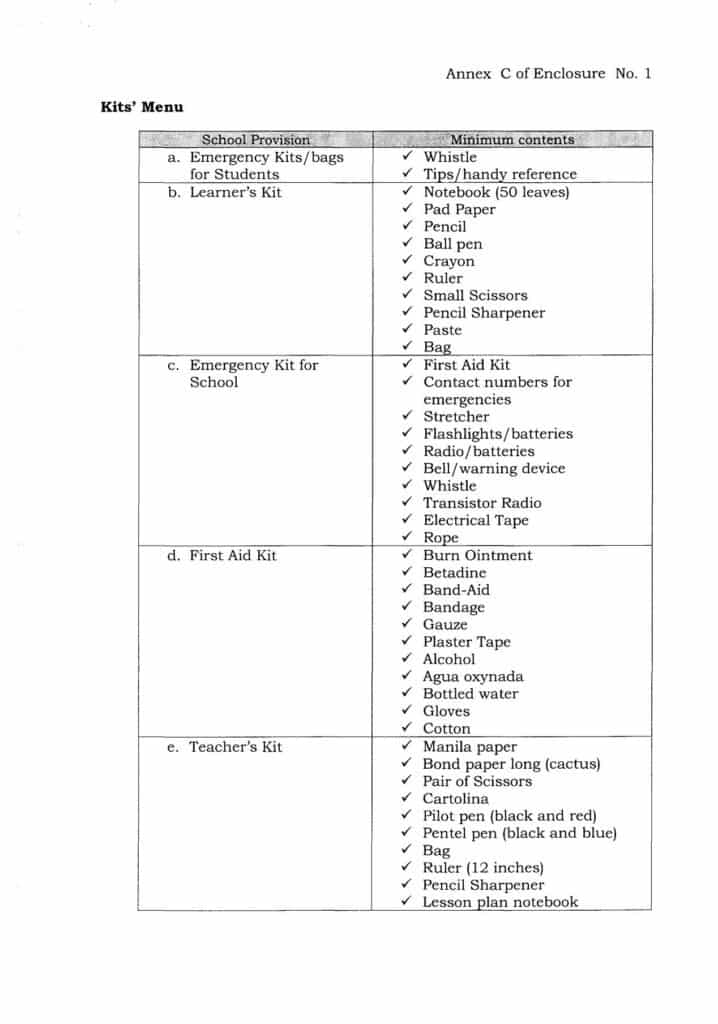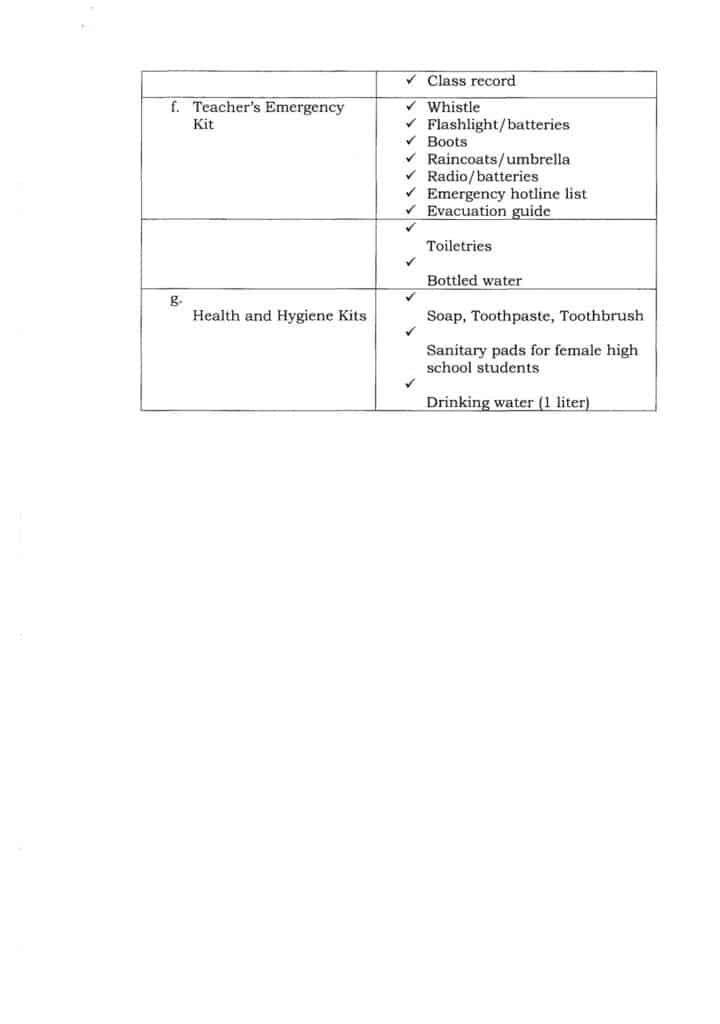(Enclosure to DepEd Memorandum No. 43, s. 2017)
Read:
- 2017 Brigada Eskwela Implementing Guidelines
- 2017 Brigada Eskwela School Safety and Preparedness Guide
- Reminders for School Heads in the Implementation of 2017 Brigada Eskwela
- 2017 Best Brigada Eskwela Implementing Schools Category
Table of Contents
STAKEHOLDER ENGAGEMENT STRATEGY
Introduction
The occurrence of disasters affected school operations to the point of depriving our students access to quality education. While we have improved our classroom standards, strengthened our coordination with partners for disaster response and capacity building, and established the DRRM Service, there is a need to tighten support for school level implementation of disaster risk reduction.
Disaster preparedness of schools is an important factor to achieve resilience in our communities. DepEd, through 2017 Brigada Eskwela, seeks to mainstream disaster preparedness principles in readying schools for the opening of classes. More than the usual menu of provision for schools such as putting up of fences, painting, roofing, among others, DepEd will provide a list of preparedness measures that partners could support in various capacities.
Our aim is to engage all education stakeholders, which would include the following:
- Local government units from provincial to barangay levels
- Private partners
- Academe
- Civil society organizations
- Private corporations
- Individual volunteers
Our partners could assist DepEd in the following areas:
- Support implementation of school preparedness and safety measures
- Provision of emergency kits and education supplies for teachers and students
- Information, Education, Communication of DRRM
The matrix below provides specific steps that target partners could take for their active engagement during the Brigada Eskwela week.
How to Engage the Stakeholders / What Each Stakeholder Can Do
Stakeholders / Nature of Engagement (EXTERNAL)
Provincial Government Units
a. Coordinate with DepEd division offices
b. Secure a copy of the school preparedness checklist
c. Convene LSB to identify possible support on school preparedness
d. Mobilize local support through the business sector, philanthropies, academe and local organization to assist schools’ preparations for class opening
Municipal/City Government Units
a. Coordinate with DepEd division/district offices
b. Secure a copy of the school preparedness checklist
c. Convene LSB to identify possible support on school preparedness
d. Mobilize local support through the business sectors, philanthropies, academe and local organization to assist schools’ preparations for class opening
e. If available, include schools in the early warning system implemented in the locality
Barangay Government Units
a. Coordinate with nearby elementary and / or secondary school
b. Participate in school preparatory meetings for Brigada Eskwela
c. Mobilize local assistance to support school preparedness strategies
d. Secure a copy of the school preparedness checklist
e. Support the school preparedness strategies
f. Assist schools in establishing an early warning system
Private Partners
a. Coordinate with DepEd division or district or school
b. Secure a copy of the school preparedness checklist
c. Provision of Emergency kits/bags for students, teachers and schools, teacher’s kit, learner’s kit,
d. Provision of advocacy/information materials for schools
e. Support the school preparedness strategies
Local CSOs and Volunteers
a. Coordinate with target elementary and/or secondary schools
b. Secure a copy of the school preparedness checklist
c. Signify interest to assist school during preparation for class opening
d. Participate in school preparatory meetings for Brigada Eskwela
e. Identify and communicate support that will be provided to schools
f. DRRM Service orientation for parents
g. Assist in the conduct of risk profiling
h. Support the school preparedness strategies
Parents
a. Participate in school preparatory meetings for Brigada Eskwela
b. Support the school preparedness strategies
EXTERNAL
Central
a. Issuance of School preparedness guide, which provides checklist on school preparedness measures
b. Prepare guidelines on conducting risk profiling based in the following considerations:
- Location of the school
- Immediate environment of the school
- Historical experience of disasters
Region
a. Conduct planning meeting with Dos to determine school needs
b. Provide assistance to Dos in formulating strategies to support school preparedness
c. Monitor and prepare report on the implementation of preparedness strategies
Division
a. Mobilize assistance from education partners and other government agencies for schools’ implementation of preparedness measures
b. Coordinate with local government agencies on local risk profiling
c. Ensure availability of the summary of school level data for local partners’ preference
d. Prepare list of schools that would be needing most assistance from partners
e. Ask local fire bureau, local PNP, local AFP to participate in ‘’How to Make Your School Safer” campaign
f. Ensure support is equitably distributed to all schools
Schools
a. Distribute emergency kits/bags to students and teachers, learner’s kit and teacher’s kit (See Annex C of Enclosure No. 1)
b. Spearhead the implementation of school preparedness guide
2017 Brigada Eskwela Kits’ Menu

